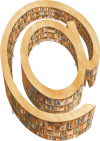About the Journal
Focus and scope
DigItalia, rivista del digitale nei beni culturali, focuses on essays and debate revolving around the application of digital technologies to the conservation and valorisation of cultural heritage.
Peer Reviewing
The articles published in the "Saggi", "Progetti" and "Documenti e discussioni" sections are peer reviewed.
Frequency of publication
DigItalia is published every six months, since 2005.
Open Access Policy
Every issue is published and freely available online, in order to foster and share contents and knowledge at a global level.
Code of ethics
DigItalia is a scientific peer-reviewed journal. Proposals can be submitted by Authors or members of the Scientific board. All parties involved - Director, Authors, Editorial Staff and Referees - know and share the following Code of ethics:
Director's, Editorial staff and Scientific board duties:
- the Director, the Editorial staff and the members of the Scientific board shall evaluate the proposals received on the basis of their content, without regard to authors' race, gender, sexual orintation, religion, ethnicity, citizenship, political orientation;
- the Director, with the support of the Editorial staff and the Referees, is responsible for deciding which of the articles submitted should be published; the final decision shall be made by the Director;
- the Director and the Editorial staff are committed not to sharing information about the proposals to third parties other than the Referees, before their publication;
- the Director, the Editorial staff, the Scientific board and all parties who, for various reasons, have access to the content of a proposal before its publication are committed not to using it in other works without the Authors' consent.
Authors' duties:
- Authors' shall propose original works and clarify the sources at the base of their research;
- Proposals shall not have been published elsewhere; furthermore, while under evaluation by the Editorial staff of DigItalia, a work shall not be submitted to other editors;
- Authors shall declare if their work, or part of it, has been previously published in other form (proceedings, posters, etc.);
- Authorship of the proposals shall be clear and explicit, and limited to those who gave a significant contribution to the text (conception, structuring, research and data interpretation), who shall be identified as co-authors. All authors and co-authors of a proposal shall check and approve it before the submission;
- Authors shall declare explicitly that their research outcome is not affected by conflicts of interest;
- Authors shall declare that the use of pictures and images in their contributions is compliant with copyright law and, if needed, that they received the proper authorizations;
- As soon as the Authors find significant errors or inaccuracies in the submitted texts, they shall inform the Director or the Editorial staff and cooperate to amend or change the proposals.
Referees' duties:
- Referees shall maintain the confidentiality of the texts received and avoid to show them or discuss them outside the editorial process;
- Reviews shall be submitted within agreed time. As soon as unexpected circumstances arise, preventing the Referees from respecting the agreed deadline, they shall inform the Editorial staff and, if necessary, resign the task;
- Reviews shall be objective and impartial. The evaluation shall be expressed without criticizing or offending Authors. Referees shall express their evaluation with clarity, supporting their arguments with proper sources and documentation;
- Referees shall refuse or resign the task whenever they find themselves in a conflict of interests arising from the text, the Authors or other circumstances.
Journal sections
Issues are divided in:
- saggi (peer reviewed)
- progetti (peer reviewed)
- documenti e discussioni (peer reviewed)
- eventi
- segnalazioni
Journal history
The first issue was published in 2005 as the ICCU began its involvment in digital projects related to the Italian Digital Library (Biblioteca Digitale Italiana - BDI). DigItalia is published every six months.





